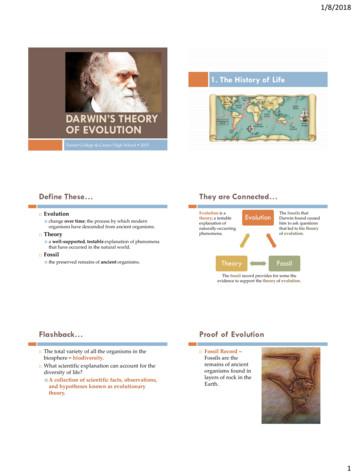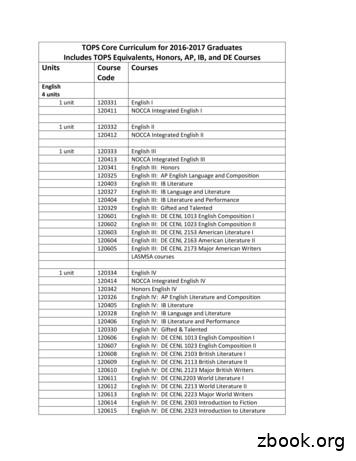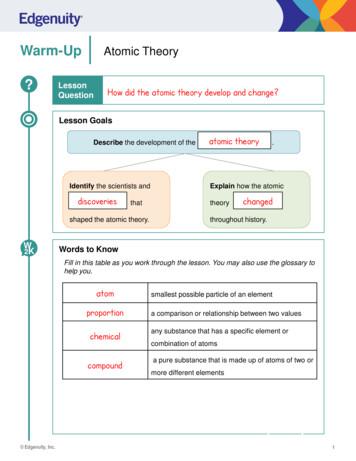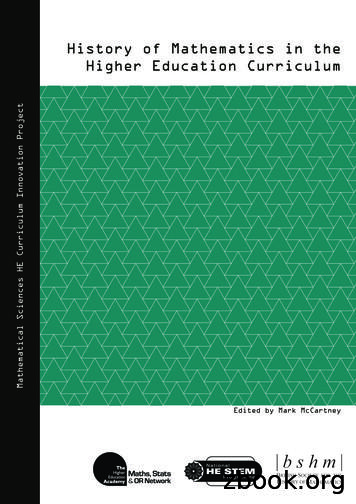Arbe3200 History And Theory In The Built Environment 3-PDF Free Download
Bible Translation Theory: History This thesis begins with an essential history of Bible translation theory, and it is important to highlight this discussion as (1) an essential history (it is selective not exhaustive) and (2) a history of translation theory (rather than practice). Any survey of the history of translation is
Humanist Learning Theory 2 Introduction In this paper, I will present the Humanist Learning Theory. I’ll discuss the key principles of this theory, what attracted me to this theory, the roles of the learners and the instructor, and I’ll finish with three examples of how this learning theory could be applied in the learning environment.File Size: 611KBPage Count: 9Explore furtherApplication of Humanism Theory in the Teaching Approachcscanada.net/index.php/hess/article/view (PDF) The Humanistic Perspective in Psychologywww.researchgate.netWhat is the Humanistic Theory in Education? (2021)helpfulprofessor.comRecommended to you b
Evolution is a THEORY A theory is a well-supported, testable explanation of phenomena that have occurred in the natural world, like the theory of gravitational attraction, cell theory, or atomic theory. Keys to Darwin’s Theory Genetic variation is found naturally in all populations. Keys to Darwin’s Theory
Brief History (Impredicative) Type Theory. 1971 Per Martin-Löf,A theory of Types. (Predicative) Type Theory as Constructive Set Theory. 1979 Per Martin-Löf,Constructive Mathematics and Computer Programming . 1984 Per Martin-Löf,Intuitionistic Type Theory. (Predi
Evolutionary Theory of Aging vs. Life History Theory The evolutionary theory of aging may be considered as part of a more general life history theory[20,21], which tries to explain how evolution designs organisms to achieve reproductive success (i.e., avoid extinction). Life history theory is based on mathematical methods of
220405 US History: IB History of the Americas I 220406 US History: Gifted and Talented 220409 US History: Honors 220614 NOCCA Integrated World History IV 220407 US History: DE CHIS 2013 American History I 220408 US History: DE CHIS 2023 American History II LASMSA courses 1 unit 220501 Civics 1 year 220502 Government
Fredrick Herzberg’s Two-Factor theory Douglas McGregor’s - X and Y theory David McCellands’s achievement motivation theory Alderfer’s ERG theory Vroom’s Expectancy theory (VIE) Porter-Lawler model of motivation Adam’s Equity theory Ouchi’s theory Z Fear and Punishme
theory and models / theory and practice / viewing the theory / types of theory / value of theory for social work / theoretical perspective of social work The ecological systems theory perspective 91 human ecology / systems theory
1.The domino theory developed by H. W. Heinrich, a safety engineer and pioneer in the field of industrial accident safety. 2.Human Factors Theory 3.Accident/Incident Theory 4.Epidemiological Theory 5.Systems Theory 6.The energy release theory, developed by Dr. William Haddon, Jr., of the Insurance Institute for Highway Safety. 7.Behavior Theory
Nature Basic theory Result Experiment Simulation Analytical Simulated Analytical prediction prediction Comparison of nature! Theory wrong theory Understanding Comparison right Theory wrong Theory OK not OK OK not OK (model) Simulation can bridge the gap between theory and experiment. Sometimes only choice (theory too complicated .
Location Theory: A Brief Overview There are a range of potential theoretical ways to think about these questions including: Neoclassical Firm Location Theory Growth Pole/Center Theory Central Place Theory Behavioral Approach Institutional Approach Agglomeration Theory (ala Michael Porter Cluster Theory) Each of these will be outlined in turn with a discussion of the
flict theory, communications theory, learning theory, systems theory, political theory, legal theory, as well as principles of social psychology, biology, economics, history, anthropology, philosophy, and theology. As such, mediation is a uniquely modern professi
history, criminal history, alcohol or other drug history, mental and physical illness history, unethical and professional problems, organization history, malpractice history, employment/training history, fraud history, required supervised hours, and educational
History 1301 Department of History Department: Social Sciences Discipline: History Course Number: HISTORY 1301 Course Title: United States History I Credit: 3 Lecture, 0 Lab Satisfies a core curriculum requirement? Yes, American History Prerequisites: TSI complia
15th Cent. History of Medicine see History, 15th Century 15th Cent. Medicine see History, 15th Century 15th Century History see History, 15th Century 16-alpha-Hydroxy-Estradiolsee Estriol 16alpha,17beta-Estriolsee Estriol 16beta-Hydroxy-Estradiolsee Estriol 16th Cent. History (Medicine) see History, 16th Century 16th Cent. History of Medicine .
contemporary social theory, and then I shall criticize some of its limitations and provide some new perspectives for critical theory today. To begin, however, I wish to briefly describe the origins and development of critical theory. Historical Background Critical theory is often associate
THE NEYMAN-PEARSON THEORY AS DECISION THEORY, AND AS INFERENCE THEORY; WITH A CRITICISM OF THE LINDLEY-SAVAGE ARGUMENT FOR BAYESIAN THEORY 1. INTRODUCTION AND SUMMARY The concept of a decision, which is basic in the theories of Neyman Pearson, W
ventional control theory), modern control theory, and robust control theory.This book presents comprehensive treatments of the analysis and design of control systems based on the classical control theory and modern control theory.A brief introduction of robust control theory is included in Chapter 10.
6. Quantum Theory and Relativity 6.1. Introduction 6.2. Einstein's special theory of relativity 6.3. Minkowski diagrams 6.4. The Klein-Gordon equation 6.5. The Dirac equation 6.6. Relativistic quantum eld theory 6.6.1. Introduction 6.6.2. Quantum eld theory as a many particle theory 6.6.3. Fock space and its operators 6.6.4. The scalar .
Unifying themes of critical theory the cluster of philosophical approaches to [issues of identity is] known by the umbrella term critical theory. Critical theory is today a diverse phenomenon that draws deeply and variously on strands of Marxist thought, psychoanalysis, feminist theory, postcolonialism, poststructuralism, queer theory, and
Control theories commonly used today are classical control theory (also called con-ventional control theory), modern control theory, and robust control theory.This book presents comprehensive treatments of the analysis and design of control systems based on the classical control theory and modern control theory.A brief introduction of robust
development of a new evolutionary theory, namely media naturalness theory (Kock 2004, 2005). This new theory was developed to fill a theoretical gap in connection with a non-evolutionary theory known as media richness theory (Daft and Lengel 1986; Daft et al. 1987). While evolutionary theories can bridge gaps left by non-evolutionary theories .
Key Difference - Dalton’s Atomic Theory vs Modern Atomic Theory Dalton’s atomic theory is the oldest theory about the atom. In 1808, John Dalton published his theory, which was composed of several postulates that were built based on his experiments and laws of chemical combination. A number of scientists later contributed to the development of
The Chromosomal Theory of Inheritance The chromosomal theory of inheritance was given by Boveri and Sutton in the early 1900s. It is the fundamental theory of genetics. According to this theory, genes are the units of heredity and are found in the chromosomes. chromosome theory of
McGregor's Theory X and Theory Y Two distinct views of human beings: Theory X (basically negative) and Theory Y (positive). -Managers used a set of assumptions based on their view -The assumptions shaped their behavior toward employees Theory X Workers have little ambition Dislike work Avoid responsibility Theory Y
of mathematical systems theory such as "linear systems theory" (the theory of ordinary linear differentialand difference equation systems with constant co-efficients together with the theory of linear automata) or the theory of finite state machines for practical design and analysis tasks. In the past such tools have
theory. While Darwin's theory of evolution is still being debated, there's absolutely no proof that societies are continually evolving. When Engels and Marx later based their communist theory on Lewis Henry Morgan's theory of anthropology in 1877, they again based the theory of communism on an unprovable theory.
Probability theory is the most directly relevant mathematical background, and it is assumed that the reader has a working knowledge of measure-theory-based probability theory. Chapter 1 covers this theory at a fairly rapid pace. Theory of Statistics c 2000-2020 James E. Gentle
Number Theories I Number theory studies properties of numbers, such as 2; 1;22 7, p 2, or p. I There are many subareas of number theory, such as Analytic number theory, Theory of Diophantine approximation, etc. I Algebraic number theory studies numbers that are roots of polyno
McGregor‟s Theory X& Theory Y, Herzberg‟s Two Factor Theory& McClelland‟s Three Needs Theory, Contemporary Theories of Motivation: Adam‟s Equity Theory & Vroom‟s Expectancy Theory, Case Study. 4 Hrs . Page 8 of 67 UNIT - V Managers as Leaders: Early Leade
Type theory [58] was introduced by Per Martin-L of with the intention of providing a foundation for constructive mathematics [69]. A part of constructive mathe-matics is type theory itself, hence we should be able to say what type theory is using the formal language of type theory. In addition, metatheoretic properties
building, particularly to those students interested primari- ly in theory about human social life. Most were interestec: in theory of the human educative process. Some. of the students wanted themselves to construct theory, bur most wanted to be in a position to be intelligent consumers of theory. They wanted to use the best of theory in their .
Component 1: Media Products, Industries & Audiences 3 Reading: Theory Booklet Theory Key term Page Number Roland Barthes Semiotics 4 Stuart Hall Audience reception theory Encoding & Decoding 21 31 Edward Said Ethnicity & Postcolonial theory 27 Levi-Strauss Binary Opposites 6 Albert Bandura Effects Theory/Hypodermic Needle 32 George Gerbner Cultivation Theory 33
Thus, his work falls firmly within the field of the history of music theory and "aims to establish a new rapport between musicology and music theory" (xv). Second, and more important, he is a Dutchman trained in the Netherlands. This allows for a wonderfully unvarnished and incisive view of pc set theory, this bedrock of American music theory.
Use of grounded theory in medical research l 9 A Brief History of Grounded Theory Designs 1967 Glaser and Strauss book Discovery of Grounded Theory Glaser, 1992, Basics of Grounded Theory Analysis 1990, 1998, 2008, & 2015 Strauss & Corbin; Basics of Qualitative
shaped the atomic theory. Warm-Up Lesson Question Lesson Goals Atomic Theory Words to Know Fill in this table as you work through the lesson. You may also use the glossary to help you.? W 2K Describe the development of the . Explain how the atomic theory throughout history. How did the atomic theory
MUS 1610 Music Theory And Ear Training I 2 4 MUS 1620 Music Theory And Ear Training II 2 4 MUS 2610 Music Theory And Ear Training III 2 4 MUS 2620 Music Theory And Ear Training IV 2 4 MUS 3610 Form And Analysis 3 MUS 4620 Counterpoint: Introduction 3 Music History and Literature 2 MUS 2410 Music History And Literature I: World Music And Jazz 3
Barron's sat subject test math level 2 pdf free download. SAT U.S. History Subject Test syllabus includes: Topic Weightage of Questions Political history 31-35% Economic history 13-17% Social history 20-24% Intellectual and cultural history 13-17% Foreign policy 13-17% SAT World History: Candidates can opt for the SAT World History Subject tests in the months of August, December, and .
History and is currently editing an Encyclopedia of Modern World History. He has written several thematic studies in world history, including The Industrial Revolution in World History (2nd ed., Westview, 1998), Gender in World History (2nd ed., Routledge, 2006), Consumerism in World History (2nd ed.,
Contents Introduction 5 Teaching the history of mathematics at the University of St Andrews 9 History in the undergraduate mathematics curriculum – a case study from Greenwich 13 Teaching History of Mathematics at King’s College London 15 History for learning Analysis 19 History of Mathematics in a College of Education Context 23 Teaching the history







































